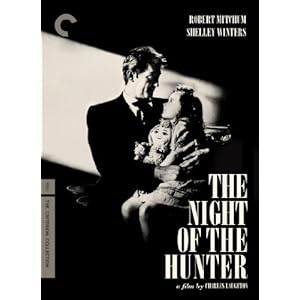
I have seen two movies featuring Shelley Winters recently, and they both involve men marrying her only because of ulterior motives. That doesn't mean anything, but there you go.
The Night of the Hunter was received poorly when it was released in the 50s and was actor Charles Laughton's only work as a director, which is unfortunate because he clearly was talented and film viewers in the 50s didn't know shit about shit. Hunter is a very creepy, effectively moody film, taking a lot from German expressionism and film noir to create its unique style. At the center of it is Robert Mitchum in a completely amazing performance as Harry Powell, a preacher with hate tattooed on the fingers of one hand and love on the other. He is able to charm normal people with his righteousness and friendliness, but the fact that he begins the story sharing a prison cell with a man condemned to hanging for double homicide should tell you all you need to know. The man hid $10000 with his two children, and after Harry is released, he pursues the man's widow (played by Winters) with the intention of finding it. He manages to win her and her daughter over for the most part, but John can see through him.
Eventually Winters catches on, and it's not long before the kids are on the run. They find an unlikely source of help, and it's not long before Powell's sins catch up with him. But along the way there's a hell of a lot of amazing imagery and creepy Mitchum to make it easily one of the best thrillers of the era. The sets will often change in ways that reflect the mood, sometimes subtly and sometimes not. The use of shadow is the most prominent and interesting, and there's also an underwater shot that is one of the most haunting I've ever seen. It's not a very nice movie, and I can sort of understand why audiences weren't ready for it yet... even if the German influence came from films made decades earlier. But it's one of those older movies that gets better as it ages, when some of the stuff it does loses its sheen of unbelievable shock and can be appreciated for the art behind them. I didn't care for how much of the story revolved around a couple kid actors, but they do well enough not to ruin a pretty damn good film.
Saturday, January 29, 2011
The Night of the Hunter
Saturday, January 8, 2011
Lolita

Lolita is an early film of Stanley Kubrick, and it feels the most like a typical Hollywood production of the time of anything I've seen of his, although you can still tell it's his work. For one thing, it's subject matter that most directors of the period wouldn't even dream of touching, and just enough of his style peeks through the traditional cinematography. It's probably too long, and it feels like a very compromised version of what he probably wanted to make, leading me to think he probably should have waited at least a decade. It's still a pretty good movie though, making great use of its cast and telling a very controversial story without getting too specific about it.
James Mason plays Humbert Humbert, a man who movies in with and even marries a woman played by Shelley Winters after falling in love with her teenage daughter, played by Sue Lyons. Peter Sellers also stars as the eccentric writer Clare Quilty, and watching him be Peter Sellers was often the highlight of the movie. His real significance to the story is not made clear for a long time, but right from the opening scene with him in a drunken daze, the performance is both a comedic and dramatic triumph. Just a completely bizarre individual played with a lot of skill by a singular actor. Lyons is also pretty darn good, looking older than she actually was and having the screen presence of an adult despite her youth. The story doesn't work if you don't buy her as something more than your standard underage girl, and she pulls it off. Humbert is sometimes a hard man to relate to, but he becomes a viable main character despite some very serious personal issues.
Lolita manages to be interesting the whole way through despite the main driving force of the plot being only suggested the entire time. It's a delicate balance to have what's really going on be known to the audience so they understand why everything else is happening, while avoiding crossing whatever line they couldn't have back then. It's sort of weird to see this kind of plot filmed in such a classic way, and it again makes me wonder what it would have been like if Kubrick had made it in full auteur mode. Either way, it gets his stylist career back on track after the Kirk Douglas-heavy Spartacus and opened the door for his next film, also starring Peter Sellers, which is my favorite of his and one of my favorites of all time. Lolita is really not Kubrick's best work, but it's plenty watchable enough if you want to see more.

































